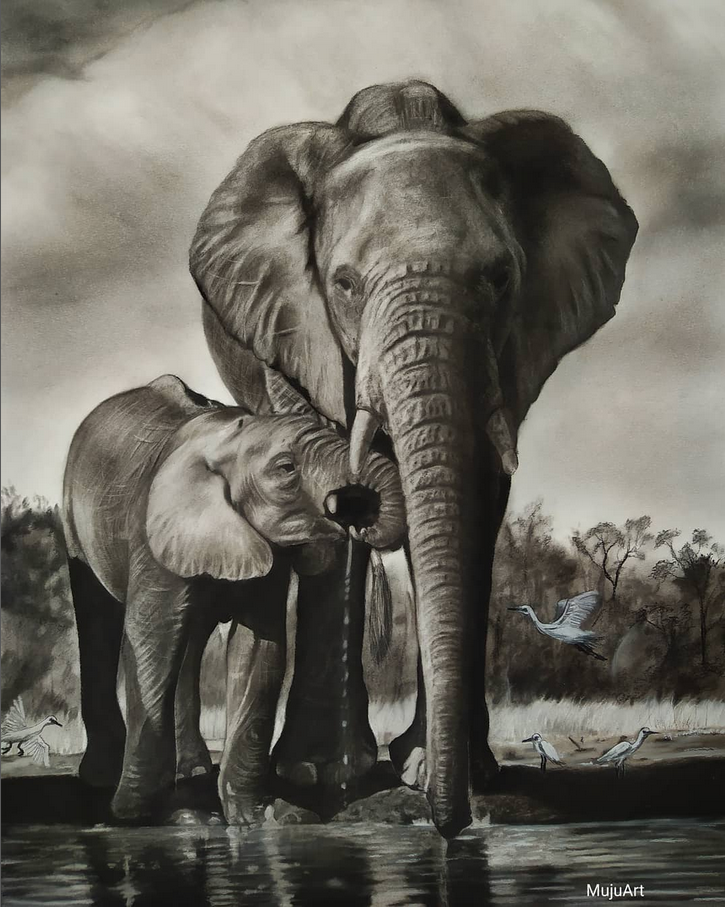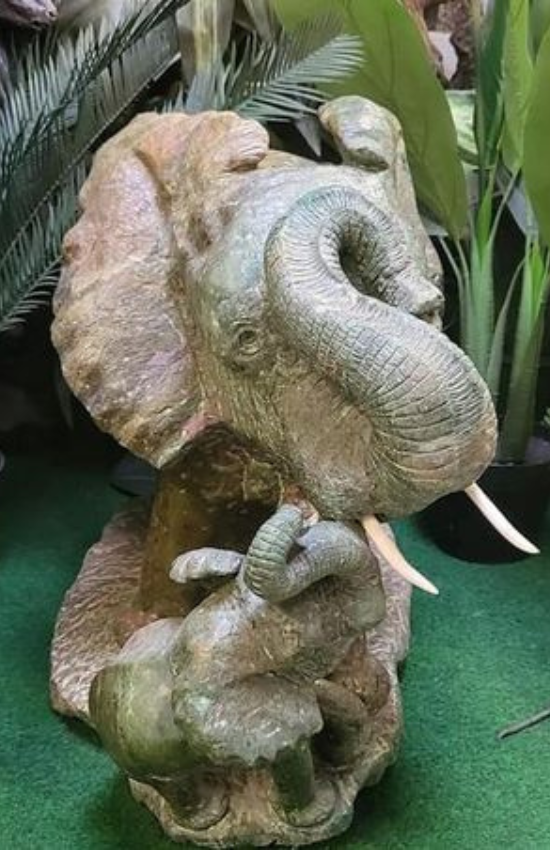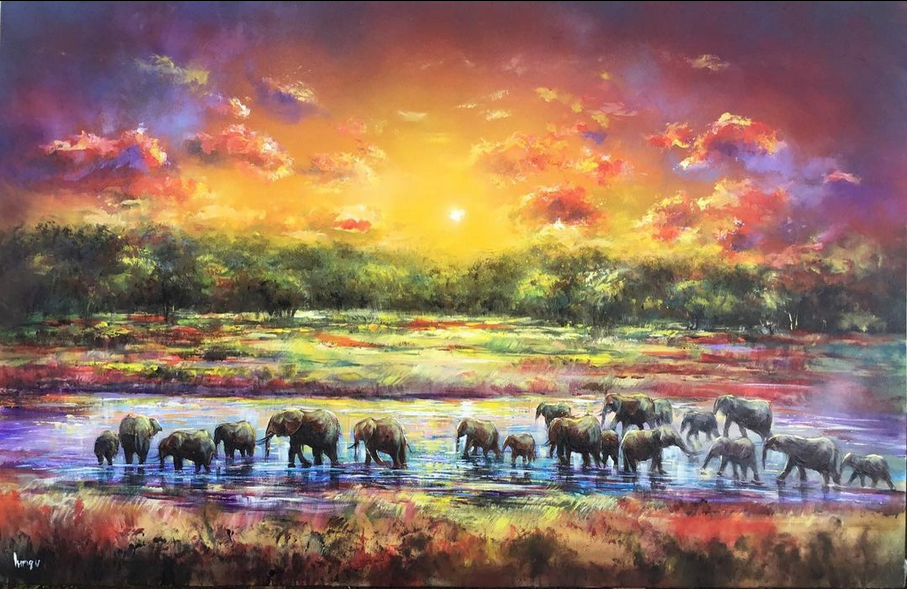Discover the Majestic Elephants during your Holidays to Zimbabwe
Elephants are fascinating creatures that have captured the imagination of people for centuries. They are the largest land animals on Earth, native to Africa and Asia. With their long trunks, elephants are known for their intelligence and strong social bonds. They are also vital to the ecosystem, playing a crucial role in maintaining the balance of their habitat through herbivory and seed dispersal.
During your holiday to Zimbabwe, during a safari, you can explore the world of elephants and witness their grandeur in their natural habitat. Zimbabwe is ""Home"" to two species of elephants, the African and Asian elephants, which differ in size and appearance. African elephants are larger and heavier than Asian elephants, weighing on average 7 tons (6,350 kg) and 5 tons (4,500 kg), respectively.
Despite their massive size, elephants are not built for speed and have slow, steady movements. They can reach a maximum speed of 40 km/h (25 mph) but typically move at a slower pace, around 25 km/h (15 mph). However, elephants are incredibly strong and powerful and can be dangerous when agitated. Their massive size and weight give them great momentum, making them difficult to stop once in motion.

Elephants are herbivores and their diet consists mainly of leaves, grasses, bark, fruits, and roots. They can consume up to 300 pounds of food in a single day. Adult elephants can eat up to 5% of their body weight in food, which can amount to more than 400 pounds of food per day. Interestingly, elephants can get drunk. In some regions, elephants have been known to consume fermented fruit from marula trees, which can have an intoxicating effect on them. The behavior of intoxicated elephants can be erratic and dangerous.
Elephants play a vital role in the ecosystem, and their decline due to habitat loss and poaching is a cause for concern. During your Zimbabwe holiday, you can visit a Safari park to witness the grandeur of elephants and other wild animals in their natural habitat. Always follow the guide's instructions for a safe and exciting experience.

A very well-carved Shona sculpture of an elephant from green verdite. The sculptor is unknown to us. African elephants have been a great influence on the sculptors in Zimbabwe from the early days. Stones used by Sculptors of Zimbabwe. Stones used by Sculptors of Zimbabwe
If you encounter an elephant in the bush during your Zimbabwe holiday, it's important to remember that elephants are generally not aggressive towards humans, but they can be territorial and may charge if they feel threatened. Here are some tips to follow:
Stay calm and avoid sudden movements or loud noises. Speak softly and move slowly.
Keep a safe distance, ideally at least 30 meters away.
If the elephant is in a herd, do not get between the elephant and the rest of the herd. This can trigger a defensive reaction.
Avoid blocking the elephant's path or cutting off its escape route.
If the elephant is showing signs of agitation, such as flapping its ears, trumpeting or mock charging, back away slowly while keeping an eye on the animal.
If the elephant charges, do not run. Instead, stand your ground and try to make yourself look larger by raising your arms and jacket or backpack. Back away slowly, and avoid turning your back on the elephant.
If the elephant knocks you down, curl up in a fetal position and protect your head and neck with your arms.
Remember that it's always best to avoid disturbing wildlife in their natural habitat and to keep a safe distance from all wild animals. All wild animals are extremely dangerous.

During your Zimbabwe holiday, you can also learn about the fascinating relationship between elephants and dung beetles. Dung beetles play a vital role in the ecosystem by removing elephant dung, which helps to prevent the spread of disease and parasites. You can witness this relationship in action in the parks.
Finally, Zimbabwe is also ""Home"" to many talented sculptors who have been inspired by African elephants. You can collect Shona sculptures of this beautiful animal during your Zimbabwe holiday, which will ensure you will never forget the experience.
A short video staring African Elephants - Come for a holiday to Zimbabwe Should the item be blocked due to GDPR kindly click on Item. Here you can learn what GDPR is!
[
Discover the Majestic Elephants during your Holidays to Zimbabwe
Elephants are fascinating creatures that have captured the imagination of people for centuries. They are the largest land animals on Earth, native to Africa and Asia. With their long trunks, elephants are known for their intelligence and strong social bonds. They are also vital to the ecosystem, playing a crucial role in maintaining the balance of their habitat through herbivory and seed dispersal.
During your holiday to Zimbabwe, during a safari, you can explore the world of elephants and witness their grandeur in their natural habitat. Zimbabwe is ""Home"" to two species of elephants, the African and Asian elephants, which differ in size and appearance. African elephants are larger and heavier than Asian elephants, weighing on average 7 tons (6,350 kg) and 5 tons (4,500 kg), respectively.
Despite their massive size, elephants are not built for speed and have slow, steady movements. They can reach a maximum speed of 40 km/h (25 mph) but typically move at a slower pace, around 25 km/h (15 mph). However, elephants are incredibly strong and powerful and can be dangerous when agitated. Their massive size and weight give them great momentum, making them difficult to stop once in motion.

FOR THE LOVE OF ELEPHANTS
Elephants are herbivores and their diet consists mainly of leaves, grasses, bark, fruits, and roots. They can consume up to 300 pounds of food in a single day. Adult elephants can eat up to 5% of their body weight in food, which can amount to more than 400 pounds of food per day. Interestingly, elephants can get drunk. In some regions, elephants have been known to consume fermented fruit from marula trees, which can have an intoxicating effect on them. The behavior of intoxicated elephants can be erratic and dangerous.
Elephants play a vital role in the ecosystem, and their decline due to habitat loss and poaching is a cause for concern. During your Zimbabwe holiday, you can visit a Safari park to witness the grandeur of elephants and other wild animals in their natural habitat. Always follow the guide's instructions for a safe and exciting experience.

A very well-carved Shona sculpture of an elephant from green verdite. The sculptor is unknown to us. African elephants have been a great influence on the sculptors in Zimbabwe from the early days. Stones used by Sculptors of Zimbabwe. Stones used by Sculptors of Zimbabwe
If you encounter an elephant in the bush during your Zimbabwe holiday, it's important to remember that elephants are generally not aggressive towards humans, but they can be territorial and may charge if they feel threatened. Here are some tips to follow:
Stay calm and avoid sudden movements or loud noises. Speak softly and move slowly.
Keep a safe distance, ideally at least 30 meters away.
If the elephant is in a herd, do not get between the elephant and the rest of the herd. This can trigger a defensive reaction.
Avoid blocking the elephant's path or cutting off its escape route.
If the elephant is showing signs of agitation, such as flapping its ears, trumpeting or mock charging, back away slowly while keeping an eye on the animal.
If the elephant charges, do not run. Instead, stand your ground and try to make yourself look larger by raising your arms and jacket or backpack. Back away slowly, and avoid turning your back on the elephant.
If the elephant knocks you down, curl up in a fetal position and protect your head and neck with your arms.
Remember that it's always best to avoid disturbing wildlife in their natural habitat and to keep a safe distance from all wild animals. All wild animals are extremely dangerous.

During your Zimbabwe holiday, you can also learn about the fascinating relationship between elephants and dung beetles. Dung beetles play a vital role in the ecosystem by removing elephant dung, which helps to prevent the spread of disease and parasites. You can witness this relationship in action in the parks.
Finally, Zimbabwe is also ""Home"" to many talented sculptors who have been inspired by African elephants. You can collect Shona sculptures of this beautiful animal during your Zimbabwe holiday, which will ensure you will never forget the experience.
A short video staring African Elephants - Come for a holiday to Zimbabwe
[